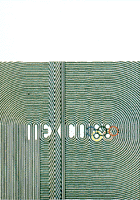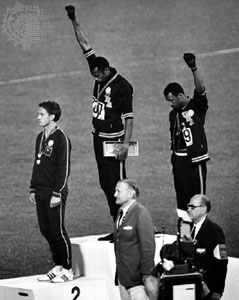 |
Mexico City, Mexico, 1968
 |
|
Olympic posters from the Archives, Olympic Museum Lausanne,
from the book The Olympic Spirit,
published by Tehabi Books |
The 1968 Olympic Games in Mexico
City were the most politically charged Olympics since the 1936
Games in Berlin. Ten days before the Games were to open, students
protested the Mexican government's use of funds for the Olympics
rather than for social programs. They were surrounded in the
Plaza of Three Cultures by the army and fired upon. More than
250 protesters were killed and over a thousand injured. At the
victory ceremony for the men's 200-metre run, Americans Tommie
Smith and John Carlos (gold and bronze medalists, respectively)
stood barefoot with heads bowed and a single black-gloved fist
raised during the national anthem. The athletes described the
gesture as a tribute to their African-American heritage and
a protest of the living conditions of minorities in the United
States. Officials from the IOC and the U.S. Olympic Committee
judged the display to be counter to the ideals of the Games;
both athletes were banned from the Olympic Village and sent
home. The Games were attended by 112 nations represented by
almost 5,500 athletes. East and West Germany competed for the
first time as separate nations. Drug and sex testing were conducted
for the first time.
 |
| American track medalists Tommie Smith (centre) and John Carlos raising black-gloved fists at the 1968 Games |
| AP/Wide World
|
The high altitude of Mexico City (2,300
metres [7,500 feet]) was both a benefit and a hindrance to track-and-field
competitors. The sprinters and field athletes thrived in the
thin air. The same was not true for the distance runners, and
African runners, who trained at high altitudes, had an advantage.
Kip Keino of Kenya did particularly well, earning gold and silver
medals. Americans Bob Beamon (long jump) and Lee Evans (400-metre
run) set world records that shattered previous marks, and Dick
Fosbury won the high jump with his revolutionary "Fosbury flop"
technique.
The pool events starred Debbie Meyer of the United States,
who won three gold medals in freestyle races, and Klaus Dibiasi
of Italy, who won the first of his three career gold medals
in platform diving. Soviet light-middleweight boxer Boris Lagutin
won his second gold medal, and gymnast Kato Sawao of
Japan won the first of his two individual gold medals in the
combined exercises.
|

